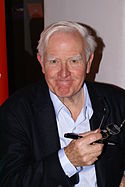John le Carre Quote
Middle children weep longer than their brothers and sisters. Over her mother’s shoulder, stilling her pains and her injured pride, Jackie Lacon watched the party leave. First, two men she had not seen before: one tall, one short and dark. They drove off in a small green van. No one waved to them, she noticed, or even said goodbye. Next, her father left in his own car; lastly a blond, good-looking man and a short fat one in an enormous overcoat like a pony blanket made their way to a sports car parked under the beech trees. For a moment she really thought there must be something wrong with the fat one, he followed so slowly and so painfully. Then, seeing the handsome man hold the car door for him, he seemed to wake, and hurried forward with a lumpy skip. Unaccountably, this gesture upset her afresh. A storm of sorrow seized her and her mother could not console her.
Middle children weep longer than their brothers and sisters. Over her mother’s shoulder, stilling her pains and her injured pride, Jackie Lacon watched the party leave. First, two men she had not seen before: one tall, one short and dark. They drove off in a small green van. No one waved to them, she noticed, or even said goodbye. Next, her father left in his own car; lastly a blond, good-looking man and a short fat one in an enormous overcoat like a pony blanket made their way to a sports car parked under the beech trees. For a moment she really thought there must be something wrong with the fat one, he followed so slowly and so painfully. Then, seeing the handsome man hold the car door for him, he seemed to wake, and hurried forward with a lumpy skip. Unaccountably, this gesture upset her afresh. A storm of sorrow seized her and her mother could not console her.
Related Quotes
Her body accepted my brutal seed and took it to swell within, just as the patient earth accepts a falling fruit into its tender soil to cradle and nourish it to grow. Came a time, just springtime last...
God whispered, "You endured a lot. For that I am truly sorry, but grateful. I needed you to struggle to help so many. Through that process you would grow into who you have now become. Didn't you know...
About John le Carre
Le Carré's third novel, The Spy Who Came in from the Cold (1963), became an international best-seller, was adapted as an award-winning film, and remains one of his best-known works. This success allowed him to leave MI6 to become a full-time author. His novels which have been adapted for film or television include The Looking Glass War (1965), Tinker Tailor Soldier Spy (1974, 2011), Smiley's People (1979), The Little Drummer Girl (1983), The Night Manager (1993), The Tailor of Panama (1996), The Constant Gardener (2001), A Most Wanted Man (2008) and Our Kind of Traitor (2010). Philip Roth said that A Perfect Spy (1986) was "the best English novel since the war".
